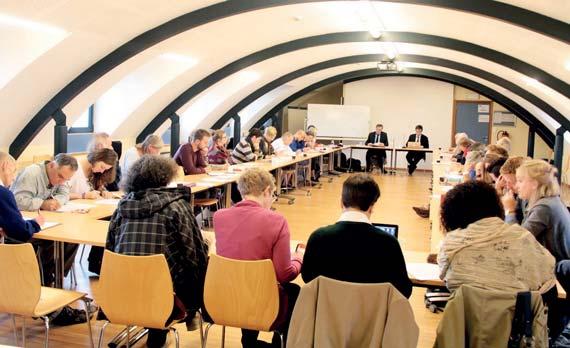
4 minute read
A widely recognized expertise in interdisciplinarity
by 5rXobdlLrFp
An interview with Prof. Pierre JADOUL, Rector of Université Saint-Louis - Bruxelles (USL-B) W hat are the key numbers and areas of excellence in the field of research at Université Saint-Louis – Bruxelles? Université Saint-Louis - Bruxelles (USL-B) excels in social sciences and humanities: law, political and social sciences, economics and business administration, philosophy, history, literature, translation and European studies. But far from having succumbed to compartmentalization, which at times may lead to differences in methodology and subjects between the various disciplines, USL-B has acquired a widely recognized expertise in interdisciplinary practice, even in research, the originality of which makes its excellence. Whilst research contributes to opening new fields of knowledge, the interdisciplinary methods remain among the most efficient ones, due to their intrinsic creativity. (19 th -21 st Centuries)”, for an amount of €173.000 and a duration of 24 months. Our research centres also develop international cooperation programs with a great number of European universities. This is the case, for example, of our European Studies Institute, which was selected in 2019 by the European Commission to launch a second Jean Monnet module. A grant was also obtained to pursue the CONFISCEU project, for a duration of 24 months and an amount of €315.000. The law project, which gathers the Utrecht University, the University of Bonn, the Babeƕ-Bolyai University, the University of Ferrara and USL-B, aims at improving cooperation between EU member states in confiscation procedures. © USL-B
Advertisement
Talking about key numbers, the most revealing translate the FNRS’ recognition of our fundamental research. Over the last 6 years, an average of 41% of our FNRS applications was successful, putting us regularly ahead of the global figures of the Fédération WallonieBruxelles (21% in 2015). We are equally proud of our average 36% admission rate to the Humanities Research Fund (Fonds pour la Recherche en Sciences humaines – FRESH) launched 5 years ago, which is an important tool in our field of disciplines.
Could you cite a few examples of the current research programs at Université Saint-Louis - Bruxelles? Like the other universities of FWB (Fédération Wallonie-Bruxelles), USL-B benefits from special research funds and manages to finance a great number of doctoral research fields. We simultaneously work on different interuniversity research projects (Action de Recherche Concertée - Concerted Actions Research - or ARC). A new ARC project was obtained in 2019 by a team of 6 researchers of USL-B, for an amount of 895.007 €. The project is entitled “L’autonomie à l’épreuve du handicap, le handicap à l’épreuve de l’autonomie” (Autonomy in the test of the handicap, the handicap in the test of the autonomy).
Thanks to the FedTwin programme, the University was granted the possibility to hire a researcher, in partnership with the “Archives générales du Royaume et les Archives de l’État dans les Provinces” (General Archives of the Kingdom and the State Archives in the Provinces), for a 10-year duration. Finally, the BELSPO-BRAIN project “YOUTH-PUMED: Youth perceptions on recreational or non-medical use of psychoactive medications”, responding to the Federal Research Programme Drugs, also started recently at USL-B.
What research partnerships have you developed at a European level? An ERC Starting Grant was obtained by a researcher from USL-B for his project “Coaching Rituals: Coaching as a social ritual: acting on people in a liberal- individualistic society (parenting, education, mental health care)”. He will benefit from a €1.5 million grant, for a 5-year duration starting in 2020. This will allow him to hire 5 researchers.
A Marie-Skłodowska Curie grant was also recently obtained for a project called “Genealogical Thinking in Nietzsche’s Wake How do you value the research work coming from USL-B? Since a few years, our university has developed its research valorisation with the support of the Walloon (DGO6) and Brussels (Innoviris) Regions. Our Knowledge Transfer Office (KTO) ensures the link between research at the university, and in the non-academic world. Its task consists in taking care of the diffusion, mobilisation and knowledge transfer to society, and in creating collaborations and exchanges between society and the university. We are an integrated member of the LIEU network, which gathers the KTOs from Universities within the FWB.
Although this type of research valorisation represents a quite recent development, let us stress that, for a long time now, some of our research centres have shown a keen interest in regional integration, particularly with regards to very advanced research on Brussels. Our Institute for Interdisciplinary Research on Brussels (IRIB) gathers these centres and hosts centres from other universities. We play a leading role in the Brussels Studies Institute (an interuniversity research platform on Brussels) and in the online magazine “Brussels Studies”. Thanks to our expertise, acquired thanks to our research work on Brussels (particularly with regards to mobility issues), we obtained many regional-funded research projects.
St. Louis - Brussels University has fifteen research centers covering all the humanities field. A network and two institutes provide the interface between research centers: the Interdisciplinarity and Society Network (RIS), the Institute forInterdisciplinary Research on Brussels (IRIB) and the Institute for European Studies.










